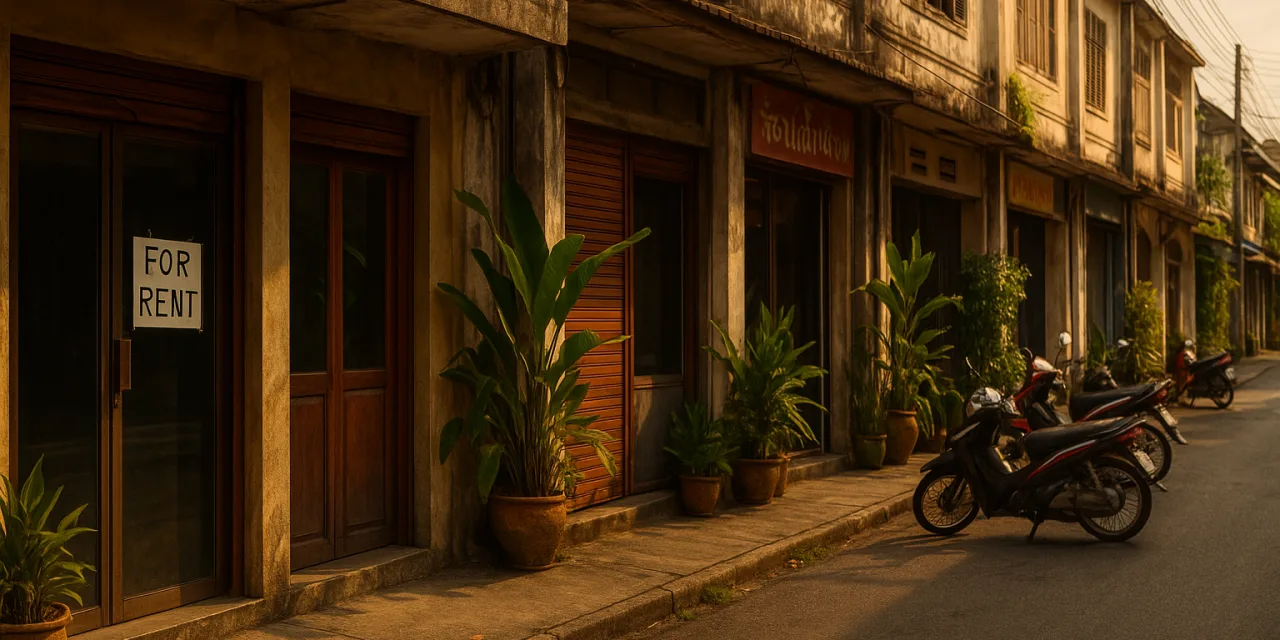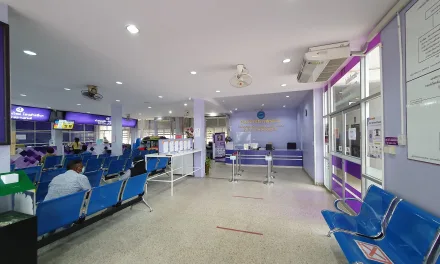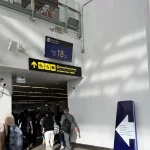Looking for a Commercial Rental in Phuket?
This practical guide walks you through the real way to find and secure a business space on the island. From offline hunting tactics and understanding key money, to lease negotiation tips and spotting red flags, this article equips you with street-smart strategies that go beyond the usual (and often outdated) property listings. Whether you're starting a café, studio, or boutique, learn how to navigate the local quirks and land a commercial rental that truly works for your business.
Tables of Contents
What to know about scouting locations, spotting offline listings, and negotiating your lease.
Where to Actually Find Listings
Let’s start with the truth. Most of the big online property portals in Southeast Asia are unreliable, especially for commercial rentals in Phuket.
Sites like FazWaz or DotProperty are often full of listings that are no longer available. You might see a great space, reach out to the agent, and get told it was rented months ago. The problem is that agents tend to treat listings like bait. Once something is posted, it stays up, just in case someone calls and they can hook them into another property.
I’ve been ranting about this for years. It’s even worse in residential, but commercial isn’t far behind. Use the portals to get a general feel for pricing or location types, but don’t rely on them for your actual search.
So where should you look instead?
Drive Around the Areas You’re Interested In
Still the most effective method. If you already know which part of Phuket you’d like to open in (Rawai, Chalong, Boat Avenue, Kata, etc.), spend time on the ground. Walk the streets. Drive around at different times of day. Look for shopfronts that seem empty or underused.
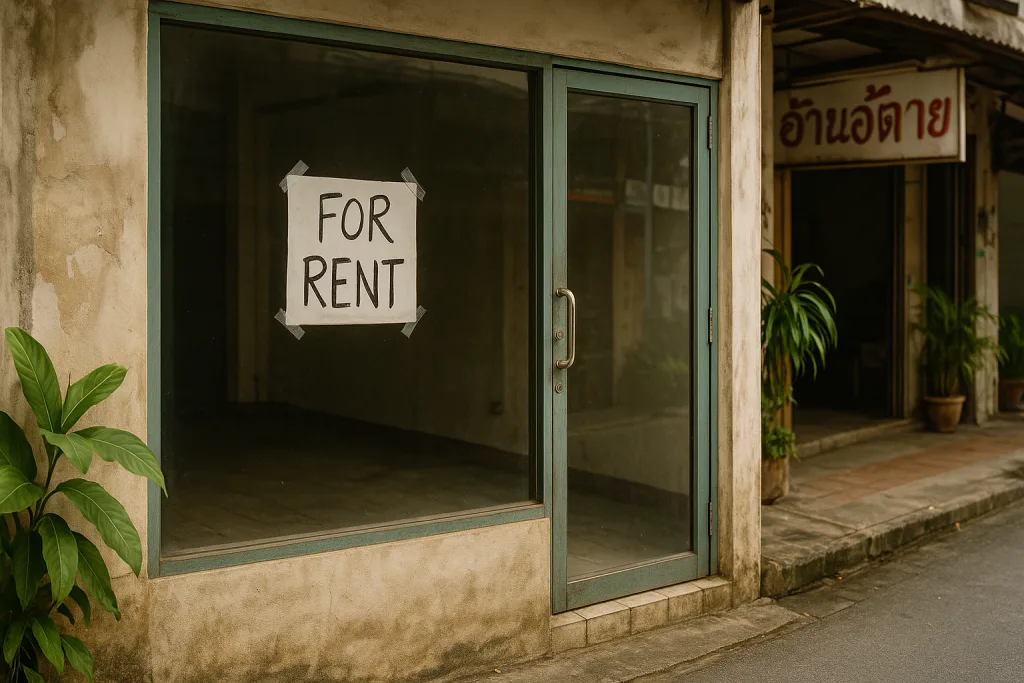
Pay attention to handwritten signs, red-printed signs in Thai, or paper taped inside glass doors. These often mean a local landlord who isn’t working through an agent. That can be a good thing. Sometimes it also means a better entry price (but not always).
Don’t assume every handwritten sign is a bargain, and don’t expect every landlord to be flexible.Just know these signs often lead to listings you won’t find anywhere online.
Ask Around
It sounds obvious, but asking people in the neighborhood works. Other business owners, taxi drivers, cafe staff, and delivery people often know what’s available before anything is listed. Sometimes a space is about to open up, and the tenant is already planning to move out quietly.
If you have Thai staff or friends, let them know what you’re looking for and ask them to help. People love to get involved, especially if you’re clear about what you want and have a finders fee.
Use Facebook Marketplace and Thai Property Groups
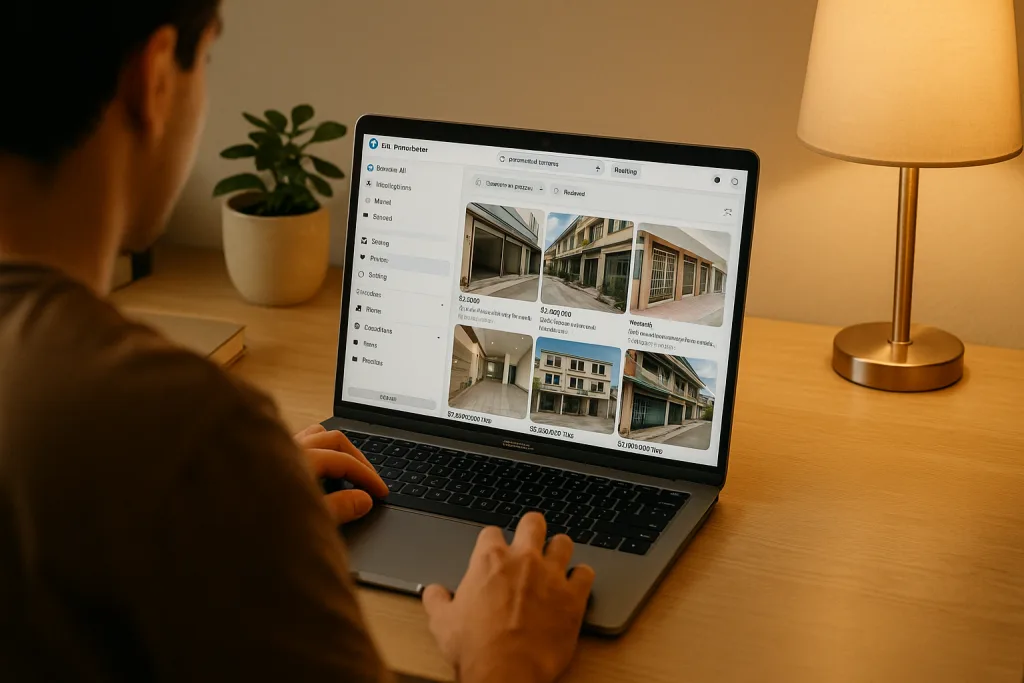
This is the only digital tool that consistently works. Check both English-speaking and Thai-only groups. English groups often post commercial spaces for takeover or small shop units, while Thai groups include more local listings and occasionally better deals.
Even if you can’t read Thai, it’s worth joining. You can have someone help you post or translate messages. These groups often include fully fitted cafés or restaurants with kitchen setups, signage, and customer flow already in place.
Consider Buying an Existing Business
Sometimes the easiest path is to take over a space that’s already operational. There are usually two types of sellers.
First, the serious ones. These owners ran a decent business, built something with value, and are ready to move on. They’ll have paperwork, proper pricing, and clear terms.

Then there are the others. These are people who opened something fast, didn’t quite make it, and now want to recoup every baht they put in. The pricing is usually unrealistic. They’re trying to sell emotion, not numbers.
That said, don’t write this method off. Sometimes you’ll find a fire sale or a diamond in the rough. If you’re prepared to move quickly and have a clear idea of what you’re looking for, a quiet takeover can be a brilliant way to get started.
What Is Key Money and Should You Pay It?
Key money is one of those things that confuses a lot of newcomers. It’s essentially an upfront, non-refundable payment made when you take over a commercial lease. It’s not part of your rent, and it’s not a deposit. It’s just money that changes hands as a condition of access.
There’s usually a reason it’s being asked for. Sometimes you’re taking over a space mid-lease, and the outgoing tenant is looking to recover their deposit, renovations, and a bit of emotional compensation for their failed attempt. Other times it’s a sublease, and the leaseholder charges every new tenant to unlock the location. Maybe it’s a landlord who doesn’t love paperwork and wants a little extra motivation to get things moving.
In some cases, it’s just a real estate agent trying to get paid more. This happens a lot in high-traffic zones like Bangla Road, where the economics are inflated. But lately it’s also been popping up in areas like Bangtao and Rawai. It’s not always a scam, but it is something you need to approach with eyes open.
When It’s Legitimate vs. When It’s Inflated
The best question to ask is: Why are they asking for key money? And more importantly, what am I getting in return?
Sometimes it’s fair. A space might come fully fitted with a functioning kitchen, nice furnishings, and the right licenses. You might be walking into something turnkey, and the key money reflects real value.
Other times, it feels like a cash grab. If the fee is high and there’s no buildout, no customer base, and no strategic location advantage, then you’re paying for nothing. That’s a red flag.
I’ve paid key money a few times. Sometimes it was worth it. Other times, I should’ve kept walking.
The key is to compare. Could you get something similar for less? Is this space truly unique, or are you just being pressured to decide fast? If it doesn’t feel right, don’t be afraid to step away.
Can You Negotiate Key Money?
In some cases, yes. You might be able to:
- Split it into installments
- Roll it into your monthly rent (higher rent, no upfront)
- Offer to sign a longer lease in exchange for a lower fee
- Negotiate partial return if you stay for a minimum period
Always remember that key money is negotiable, even when it seems non-negotiable. It depends on how motivated the landlord or leaseholder is, and how well you frame your offer.
If the number feels high, ask why. If there’s no clear reason, try to adjust or walk away. You’ll be glad you did.
Negotiating the Lease
Commercial leases in Phuket can feel like a minefield if you haven’t navigated one before. The structure, expectations, and even payment norms are often very different from what foreigners are used to. But if you approach it with patience, the right translator or representative, and a clear idea of what matters most to you, it can absolutely be done well.

What’s Typical?
In most commercial cases, a 3-year lease is standard. Landlords might say it’s a “3+3+3” deal, meaning you’ll have the option to renew two more times. But unless that renewal is written into the contract with clear pricing, what it really means is the landlord reserves the right to increase the rent or renegotiate every three years.
In high-traffic zones or areas with fast tenant turnover, you may only get a 1-year contract. This isn’t always a red flag. Sometimes it’s just because the landlord is using the same standard contract across a block of properties. In other cases, they’ve been burned before and want to see how you perform before committing.
Longer leases are sometimes available if you’re investing in serious renovations. It helps to explain your plans clearly and ask for something fair in return. If your landlord doesn’t speak your language, make sure someone tactful and local is handling the negotiation on your behalf. Poor communication leads to misunderstandings quickly.
Good leases are hard to negotiate, but they’re worth every conversation up front.
Utilities: Know What You’re Paying For
Always ask how utilities are billed. If your business is power-heavy (for example, a bakery, kitchen, or production space), this matters a lot.
Ideally, you want to pay government rates directly. But in many cases, especially when you’re renting inside a row of shop units or within a shared building, the landlord pays the bill and charges tenants a higher unit rate. Power can be marked up 30 to 50 percent in some cases.
Water works the same way, though it’s rarely a major cost unless you’re running laundry or showers.
What to Put in Writing
Here are the non-negotiables to get written into your lease:
- Rent increase cap: This limits how much the landlord can raise rent at renewal time. Without this, you risk having a good season and then being priced out of your own location.
- First right of refusal: If the landlord wants to re-lease the property, you should have the first chance to continue. Don’t assume this is guaranteed.
- Right to sublet: Some landlords forbid subletting. Others allow it only with approval. If your business involves pop-ups, shared space, or you want flexibility to pivot, include this.
- Right to sell the business: This is a big one. If you plan to sell in the future, make sure the lease can transfer. Landlords may ask for a fee. Offer a flat amount rather than a percentage. A few months’ rent is a common benchmark.
- Repairs and maintenance: This part can catch people out. In Thailand, once you’re in, most maintenance falls on you unless otherwise agreed. Clarify who handles things like roof damage, plumbing, air conditioning, or signage issues.
- Renovation terms: Get verbal agreement first, then follow with basic plans. If possible, have it written into the lease that you can make changes as long as they are safe and aesthetic. Also ask what happens when you leave. Some landlords want the property returned to its original state, which can be expensive.

Payment Structure
The most common setup is:
- 2 months security deposit
- 1 month advance rent (sometimes the last month instead)
- Month-to-month thereafter
However, some landlords will ask for 3, 6, or even 12 months up front. This can be intimidating, but if you have the cash and feel confident in the location and relationship, it can work in your favor. Some landlords highly value upfront payment and will offer better terms if you’re able to offer it.
Dealing with Cash-Heavy Arrangements
While cash is still common in many parts of Thai business culture, you don’t have to carry bricks of cash in your backpack. If a landlord insists on cash, go to the bank and have them issue it directly in your presence. Some banks even offer cheque issuance or direct cashier-to-cashier transfers between branches.
Just be cautious. Phuket is a small place, but it’s still a place. Don’t flash large amounts of money in public or do handovers in cafes. Always bring someone with you.
Use a Professional for Complex Leases
If you’re dealing with a large upfront payment, a complicated landlord, or you’re unsure about the terms, use a professional. A good local lawyer or leasing agent can make the difference between a great space and a long, expensive headache.
Get someone who knows the local market and speaks the language. You don’t need to over-lawyer a simple lease, but if you’re spending serious money or renovating heavily, it’s a smart investment.
Red Flags to Watch For
Most landlords in Phuket are fair, even if the process feels a bit unstructured at times. But every now and then, you’ll come across a situation that just doesn’t feel right. Here are a few warning signs worth paying attention to before you sign anything.
No Contract Offered
This is an instant red flag. If someone wants you to move in, pay a deposit, or start operating without a written lease, walk away. Verbal agreements might be common for storage rooms or short-term rentals, but not for your business base.
Without a contract, you have no protection if rent jumps overnight, the space is reclaimed, or disputes arise.
“Too Good to Be True” Deals
Once in a while, you might land a dream deal — a great space at a below-market rate. It does happen. But if the price seems way too low, ask why. Look into the history of the unit. Check the layout and building condition. Ask if any businesses recently left and why.
Use your gut. If it feels off, it probably is.
Landlords Who Want a Full Year Up Front (With No Flexibility)
It’s not uncommon for landlords to ask for several months of rent upfront. Some will go as far as requesting 6 or 12 months in advance. That’s not always a dealbreaker, especially if the location is solid.
But be cautious. If the landlord refuses to negotiate or give you any guarantees in return (like lease length, upgrade permission, or renewal terms), consider whether this is someone you want to work with long-term. When in doubt, ask for help reviewing the deal.
Helicopter Landlords
This one is harder to spot up front, but can become a real headache later. These are landlords who treat the property like their personal kingdom. They want to approve every sign, light fixture, and menu change. You’ll find yourself explaining every decision, big or small.
One of us once had a landlord who forbade picking fruit from a tree that grew right inside the rented space.
If you get a sense that the landlord wants to micromanage your business, take note early. That kind of oversight can wear you down fast.
💡 Bonus Tips
Let Your Thai Staff or Partners Help Negotiate
If you have a Thai team member you trust, let them lead or support in negotiations. Locals often understand the nuance in tone, body language, and phrasing that foreigners miss. Even small adjustments in how something is asked can lead to better outcomes.
Show You’re Serious (But Not Desperate)
It’s good to express interest and ask smart questions. It’s less good to come in too excited or ready to pay anything to “lock it in.” Phuket landlords have seen plenty of fly-by-night operators, and desperation can raise their guard.
Come in clear, calm, and respectful. Ask about the space’s history. Show that you understand what it takes to run a business here.
To Use an Agent, or Not?
Agents can be helpful, especially if they’re well-connected and familiar with commercial leases. But not all agents are equal. Some work with landlords to inflate prices, while others offer real value in smoothing the process and helping you avoid pitfalls.
If you’re going through an agent, ask who pays their fee and confirm they’re authorized to represent the property. When in doubt, speak directly with the landlord before signing anything.
❓ FAQ: Renting Commercial Space in Phuket
Q: Is it better to find commercial rentals online or in person in Phuket?
A: Online portals can give you a rough idea of prices and areas, but many listings are outdated. The most effective way to find a rental is to visit neighborhoods in person, look for signs, and ask local business owners. Facebook Marketplace and Thai property groups are also reliable digital tools.
Q: What is key money, and do I have to pay it?
A: Key money is a one-time, non-refundable payment sometimes required to secure a lease. It may cover previous renovations or act as a fee for a high-demand location. It’s negotiable, and not always required. If you’re asked to pay key money, make sure you understand why.
Q: How long are commercial leases in Phuket?
A: Three-year leases are common, often with the option to renew. However, in high-demand areas, some landlords offer only one-year terms. Lease length and terms vary, and longer leases may be possible if you’re investing in renovations.
Q: What should I include in a commercial lease contract?
A: Make sure your lease includes a rent increase cap, the right to renew, permission to sublet or sell the business, and clarity on who pays for repairs. If you’re planning renovations, get landlord approval in writing.
Q: Can I negotiate lease terms or payment schedules in Thailand?
A: Yes. Many landlords are open to negotiation, especially if you offer longer lease terms or higher upfront payment. You may also be able to negotiate how key money is paid or rolled into rent.
Q: Should I use a lawyer or agent when renting a business space in Phuket?
A: For simple, low-risk leases, you may be able to handle things with the help of Thai-speaking staff or a trusted friend. But for high-value leases or complex negotiations, hiring a local lawyer is highly recommended.

